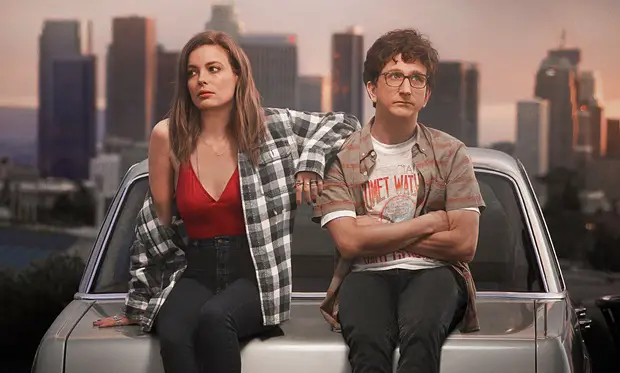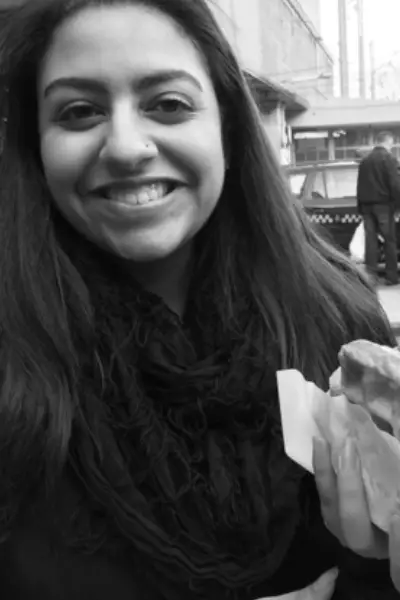He is boy, she is a girl. Can I make it anymore obvious?
His hair is a weird length, his girlfriend broke up with him for being suffocatingly “fake nice,” his sense of humor doesn’t always translate and he’s from Brookings, South Dakota.
She has porcelain skin and perfect cheekbones, is a heart-breaker and a serial dater; her apartment is perfectly decorated and she’s a producer of a radio talk show that (of course) dishes out love advice.
You know who they were in high school and you know they did not run in the same circles. But the convenience store equalizes us all, even Mickey and Gus, the unlikely protagonists of Netflix’s new original series, “Love“
The two bump into each other at a food mart one morning after having both endured sleepless nights following weird love encounters, and Gus offers to pay for Mickey’s coffee and cigarettes when he sees that she’s forgotten her wallet.
Mickey seems more annoyed by than grateful for Gus’ kind gesture and insists that he follow her home so she can pay him back, resulting in an at-times awkward and quiet trek to her house. If we perceive any romantic tension during their initial encounter it’s only because the show’s title strongly implies it.
“Community”’s Gillian Jacobs plays Mickey while Paul Rust of “I Love You, Beth Cooper” handles costar Gus. At first glance, nothing has changed; Jacobs is again playing the desirable but uninterested love interest, and Rust is once again the lovesick dork.
Fortunately, “Love” has 10 episodes to delve deeper than these initial perceptions.
We come to learn that Mickey smokes and swears incessantly, and constantly lies to herself and others (including her AA group) about her love, sex, drug and alcohol addictions. And while Gus claims to “work in television,” he’s just an on-set tutor for a mediocre supernatural TV show. He’s also relatively spineless when it comes to sticking up to the show’s producers and even to the child actors he tutors.
They’re not without their flaws, but Mickey and Gus are also undeniably endearing, thanks largely to the performances of Jacobs and Rust.
Jacobs’ realism in her portrayal of addiction is impressive. In one scene, her eyes fill with tears after she resets her sobriety app and zero days appear on the screen. Even if we haven’t all dealt with an addiction, we have all let ourselves down at one point or another. As the app begins to count one, two, three seconds of sobriety, we feel ourselves starting over with Mickey, believing we’ll do better this time.
Rust is so good at being awkward, I physically cringed away from my computer screen on more than one occasion while watching “Love.” His humor falls flat more often than not, like when a guy at a party asks Gus to tattoo something on him and he writes “sarcoma” with an arrow pointing to a mole.
The supporting cast is just as strong as its leads. Australian comedian Claudia O’Doherty plays Mickey’s quirky roommate, charming her way through each of her scenes but never stealing the show, and Dave Allen and Steve Bannos are best friends and Gus’ weird neighbors who appear occasionally and provide some uncomfortable chuckles.
Another star of the show is its soundtrack; you’ll want to Shazam every song, but no need— Spotify has already herded them all into one playlist. One great scene features one of these great songs, when Gus rocks out to Wings’ “Jet” at a party Mickey invites him to and reveals a surprisingly good voice, but even more appealing confidence. Seriously, if your music library is dull as of late, watch this series if only to (re)discover old classics and new favorites.
One complaint I can anticipate about “Love” is how slow-moving it is—the leads don’t even collide until the end of the first episode, and they don’t get together until several episodes deep. But I don’t think it ever slows enough to grow stagnant.
The comic relief of the supporting actors keep things light, as do eccentric details like Gus’ misfit friends and their parties where they write theme songs for movies that don’t have one (“He left the door ajar-lito’s way” is just one of the brilliant lyrics for “Carlito’s Way”).
And while there are no doubt drawbacks to Netflix’s bing-watching proclivity, Love actually lends itself to the format. There are no convenient commercial breaks to relieve the awkward silence after a bad joke, or the crushing boredom in between the minutes when Mickey tries to remain sober.
Many of the scenes are true enough that we recognize them in our own lives— the seconds when Mickey stares at the rotating ellipses on her cellphone screen waiting to see what Gus will text, and the disappoint when the dots disappear and he says nothing. The relatability keeps us interested, but the show never follows reality with enough detail to become tedious or boring.
The lack of weekly breaks between episodes is fitting because life and love aren’t comprised of the highlight reels some romcoms maybe lead us to believe. It’s not always (or ever) that a meet-cute leads to a dinner date filled with constant laughs and a montage of late night ice-skating on a miraculously empty Central Park ice rink.
In “Love”’s episode seven, “Magic,” Mickey and Gus’ date is a mixed bag. They share a cute moment where they sing “Blister in the Sun” together and minutes later they share an uncomfortable one where Mickey ruins a magic trick by neglecting to memorize her card. The result is that nothing feels too contrived, edited or glamorous.
Yet Love doesn’t try to revolutionize anything. It’s a dramedy featuring a dorky guy and a gorgeous girl who seem like an unlikely if not impossible match. They live in Los Angeles and both work in some aspect of entertainment. They send stupid texts like, “Sup?”
There are great and not-so-great episodes. Episode five, “The Date,” is a hilarious highlight whereas the following episode, “Andy,” is a perplexing lowlight. And for a show called Love, it has nothing big or conclusive to say about the subject.
But in the series’ final scene, Mickey and Gus meet again (this time not so randomly) at the convenience store. Throughout the show he is perpetually early while she is always late, but somehow now their timing aligns. He is fed up and she is completely vulnerable.
As she reveals her various addictions to him and explains, “I think I just need to be my myself for maybe, like, a year,” Gus kisses her. Even though it’s what we wanted —what we’re supposed to want— we wonder not for the first time whether the leads are actually good for each other.
Wilco’s “I’ll Fight” comes on as the credits roll and ties up this perfect, messy scene perfectly. Is wanting to be better, trying to work and being willing to fight enough? Love doesn’t give us the answer, but we have a year to think about it before the saga continues. The final episode is entitled “The End of the Beginning,” apropos of the second season Netflix has promised to air in 2017.
To be honest, I started watching “Love” out of boredom. I wasn’t hooked after the first episode, but I also wasn’t tired enough to fall asleep. Somewhere along the way it grew on me enough that I had to see how it would all play out.
It’s raunchy, awkward, thoughtful and funny. It may not be love at first sight, but click play and see if Love grows on you like it did on me.

















